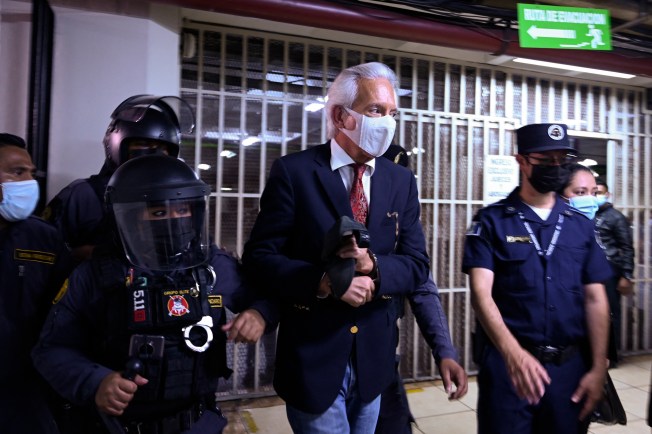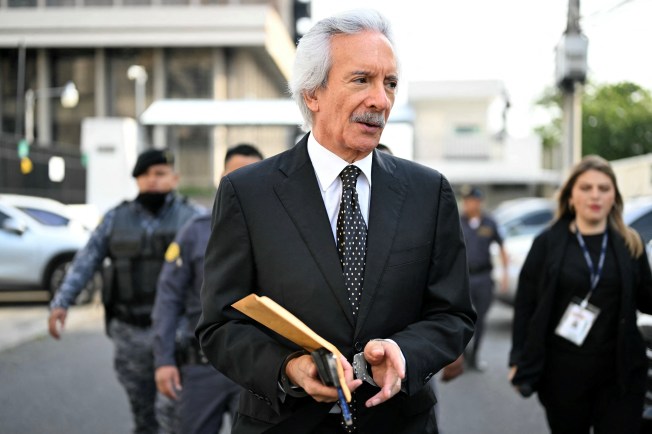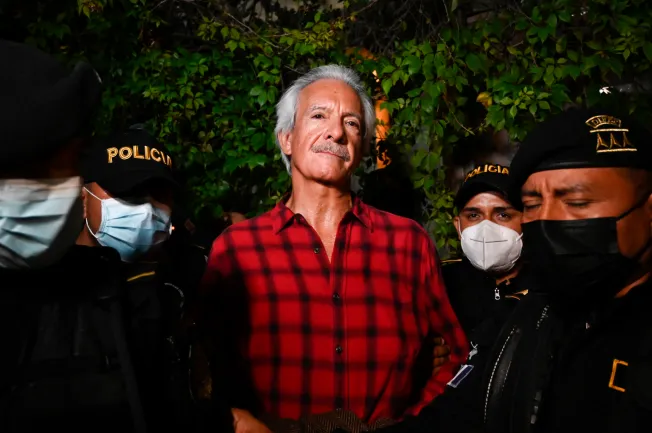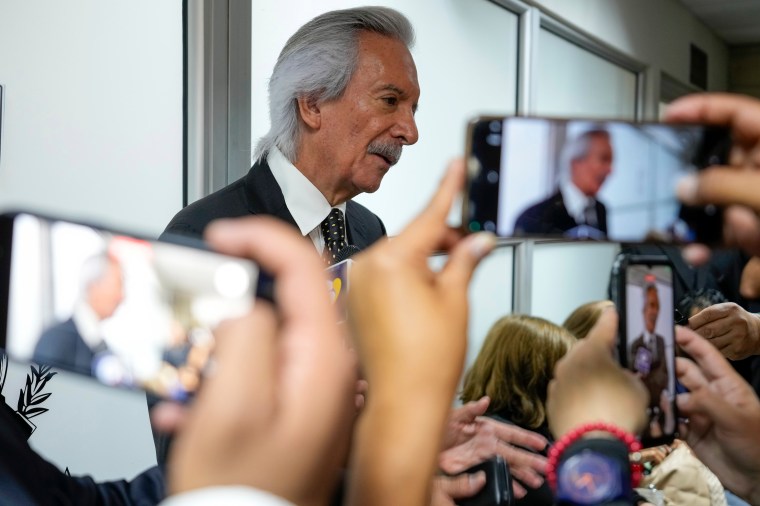Less than a month after being moved to house arrest, a Guatemalan appeals court ordered journalist José Rubén Zamora back to jail on November 15, 2024. Zamora remains in house arrest while his lawyers and the Attorney General’s Office have appealed the motion, his son told CPJ.
The decision is a new blow to press freedom in Guatemala. Zamora, president of the now defunct elPeriódico newspaper, had already spent 813 days in jail and experienced years of government harassment after his reporting challenged the country’s political elite.
Zamora was sentenced to six years imprisonment in June 2023 on money laundering charges, which were widely criticized as politically motivated. An appeals court overturned his conviction in October 2023; the retrial has been delayed by ongoing procedural hurdles.
CPJ has repeatedly urged the Guatemalan government, especially President Bernardo Arévalo, to end Zamora’s prosecution and the harassment of his family and the journalistic community.
In an interview with CPJ before the overturning of his house arrest, Zamora discussed the personal toll of these charges, his unyielding commitment to press freedom, and the growing threats faced by journalists in Guatemala’s increasingly repressive environment.
The interview has been edited for length and clarity.
What is it like to return home after more than 800 days in prison?
Returning home has been an experience full of intense emotions and unexpected moments. When I arrived home, my friends who had supported me throughout the entire process came with me to my house — 10 people who, during my imprisonment, brought me food and visited me once a week. After spending the night with them, I only slept for a few hours.
When I woke up, I found out that the directors of the Inter American Press Association (IAPA), who were gathered in Córdoba, Argentina, wanted to speak with me. And from there, calls and interviews began, one after another.
Diplomats and media from all over the world want to speak with me, and when I go for my daily walk — about 10 kilometers [6.2 miles] a day — people stop to greet me, take photos, and offer their support.
I appreciate the affection, but sometimes I feel overwhelmed. I wasn’t prepared for so much attention. I’m a shy person; I feel more comfortable writing than speaking in public, and this has been a big change. I also have health issues that I need to attend to, but I am here, trying to adapt.
I’m prepared, knowing they could come to take me back at any moment. And I’m ready here for when they come, to go back again. And I will come out again, and the time will come when they have to let me go free.

How was your experience in the Mariscal Zavala prison, located at a military base in northern Guatemala City?
Mariscal Zavala was a shock. They took me [in July 2022], with 18 armed men, and put me in a cell without any explanation.
I spent 14 days without sleep, with purple lights, and unable to communicate with my lawyers. During that time, they put insects in my cell that left wounds on my arms and legs. I also got poisoned by an insecticide that I managed to obtain to control the pests. Despite all this, my conditions improved when the new government changed: I was given better conditions, with light, heating, and more dignity.
The prosecutor’s office says it does not pursue you as a journalist but as a business owner. How do you respond to these statements?
For me, it is hard to conceive that José Rubén Zamora is not a journalist, as I have dedicated my entire life to this profession. They persecuted me and tried to imprison me just for doing my job. And when you add that they were seeking sentences for up to 20 years — the same maximum sentence given for crimes like money laundering or extortion — and they show as evidence my opinion columns, the argument that they are after me as a businessman loses all credibility.
Who is behind this, and why are they pursuing you?
What we’ve lived through in Guatemala has been a sinister metamorphosis of our democracy. Every four years, we elect a president who, rather than being a legitimate leader, is a thief, and he governs with the support of high-ranking military structures, organized crime, and monopolies. They’ve always been bothered by the fact that our newspaper did not align with their interests, that we were independent and denounced corruption and drug trafficking, which are part of that system.
Since 2007, a criminal structure has consolidated its power. It’s a web of interests that has taken over the country and is indifferent to the people’s problems. This is a power alliance that, although it has succeeded in persecuting me, has paid a high price. I think it would have been better for them if I had continued with my newspaper because, in the end, exposing their corruption was less damaging than my imprisonment.
This is not the first time you’ve found yourself in a dangerous situation because of your reporting. How has this affected you and your family?
My children never gave up. Despite the damage to their lives, they were always relentless. They worked tirelessly for my liberation and didn’t feel ashamed. The youngest one aimed to be an academic, was building a solid career and had to leave with her mother because they were after him. They even sent people to arrest him, but they were able to leave the country first. Now, he’s without a job, without documents, and his future is uncertain. It has been very tough for them and me, but they keep moving forward with strength.

In 2023, the Court of Appeals annulled your sentence on money laundering charges. What does this mean for you legally and personally?
I still don’t know the final impact. I have requested that we return to the hearing for the presentation of evidence, and I hope to present the testimonies of experts and the person who made the transaction with me. Additionally, I trust that the case regarding the travel receipts and the obstruction charge, which I consider ridiculous, will be dismissed at the intermediate hearing. The case has been intentionally delayed, but sooner or later, it will have to be resolved. If that happens, it will allow my wife to return.
What is the current status of the legal cases you are facing?
The trial that will be repeated is the most important, and I hope to present my evidence at that time. For this, the first hearing for the charges of money laundering and extortion is scheduled for September 25, 2025; there, they will set up a second hearing, likely in 2026. The case has no foundation, as the prosecutor’s office is setting up an extortion case, but they have no people to testify against either for that or for money laundering.
At one point, I was offered the possibility of going home if I accepted the charges and apologized to [former president Alejandro] Giammattei, his associate Miguel Martínez, and the press for my “immoralities.” When I refused, they began to create a second case to persecute my wife and my young son with charges of document falsification. The prosecutor’s office claims the signatures were fake, but those travel documents were legally issued by immigration.
Also, all of this happened in a unilateral hearing where I was not informed of the charges nor allowed to defend myself. This case has no evidence, but what the prosecutor’s office does is that every time there is a hearing, the judge is denounced, and the prosecutors do not show up, which leaves the case stalled.
What has the freezing of your accounts and seizure of all assets meant for you? How did the closure of the newspaper impact you?
It was devastating. Before the pandemic, I had no debts, but now I have obligations with the banks that I can’t even cover since my accounts have been frozen for two years. It’s a constant pressure.
Now elPeriódico is closed. How did you experience that process?
It was a solitary process. I witnessed the collapse of everything without being able to do anything.
I came to believe that no matter who defended me — whether the best lawyer in the world or someone without experience — the result was going to be the same. That acceptance gave me a deep sense of serenity because I understood that I no longer had control over anything. It was a moment where I decided to just go with the flow, let myself be carried by the current, and I even thought that I might spend the rest of my life in prison.
If it weren’t for organizations like the Committee to Protect Journalists (CPJ), who not only helped me get out but also gave me solidarity and support I never expected, I don’t know how I would have been able to continue.

What impact do you think elPeriódico’s closure had on Guatemala and its press?
Guatemala lost one of its most belligerent and irreverent voices. Although the country still has several media outlets, our newspaper stood out for being against abuses of power, state terrorism, impunity, and corruption. We fought for democracy, freedom, and equality of opportunities. We were probably the most uncomfortable and bothersome media for the powerful.
Despite being small, we knew that we caused significant moral damage to the country’s big thieves, which gave us great satisfaction.
How do you view the current press freedom situation in Guatemala, especially in relation to the journalists who investigate and publish the abuses of power under this government, compared to the previous one?
This president is an exception. He is a decent man, but he lacks control over Congress and the judicial system. The prosecutor’s office is also going after him, and I am sure they will try to remove his immunity to subject him to a legal process.
It’s encouraging to see that many journalists are still working and haven’t given up, even though they face constant risks. The fight for freedom is not philosophical; it is existential. It’s a daily conquest that is achieved by rejecting the abuses of the established power.
Looking ahead, do you see yourself continuing in journalism?
I would like to continue in journalism, but my lawyers have advised me to be cautious. They imprisoned me for two reasons: for traveling too much and because I can influence the media. That’s why, until at least the next two years pass, I must avoid speaking publicly, although it is very difficult for me to stay silent.
Despite everything, I will always keep fighting. We must maintain our patience, courage, and faith without losing hope. It’s essential to develop the ability to overcome our fears and, whenever possible, break barriers.
In the end, freedom is the fundamental pillar of democracy.
